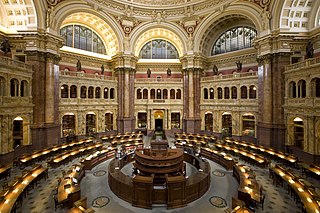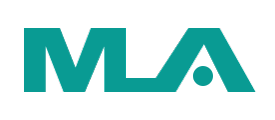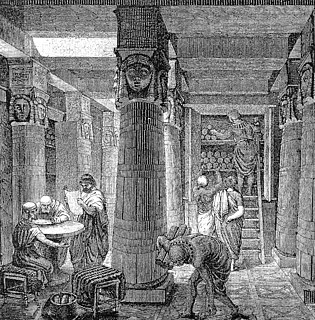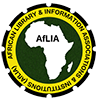
A library is a collection of materials, books or media that are accessible for use and not just for display purposes. A library provides physical or digital access materials, and may be a physical location or a virtual space, or both. A library's collection can include printed materials and other physical resources in many formats such as DVD, CD and cassette as well as access to information, music or other content held on bibliographic databases.

A librarian is a person who works professionally in a library providing access to information, and sometimes social or technical programming, or instruction on information literacy to users.

Open access (OA) is a set of principles and a range of practices through which research outputs are distributed online, free of access charges or other barriers. With open access strictly defined, or libre open access, barriers to copying or reuse are also reduced or removed by applying an open license for copyright.

A research library is a library which contains an in-depth collection of material on one or several subjects. A research library will generally include an in-depth selection of materials on a particular topic or set of topics and contain primary sources as well as secondary sources. Research libraries are established to meet research needs and as such are stocked with authentic materials with quality content. Research libraries are typically attached to academic or research institutions that specialize in that topic and serve members of that institution. Large university libraries are considered research libraries, and often contain many specialized branch research libraries. The libraries provide research materials for students and staff of these organizations to use and can also publish and carry literature produced by these institutions and make them available to others. Research libraries could also be accessible to members of the public who wish to gain in-depth knowledge on that particular topic.
The American Library Association (ALA) is a nonprofit organization based in the United States that promotes libraries and library education internationally. It is the oldest and largest library association in the world, with 49,727 members as of 2021.

China Agricultural University is a public research university in Beijing, People's Republic of China specializing in agriculture, biology, engineering, veterinary medicine, economics, management, humanities and social science. It was formed in 1995 through the merger of the Beijing Agricultural University and the Beijing Agricultural Engineering University, which evolved from one of the earliest agriculture institutions in China founded in 1905.

The Medical Library Association (MLA) is a nonprofit, educational organization with more than 3,400 health sciences information professional members and partners worldwide.
The Special Libraries Association (SLA) is an international professional association for library and information professionals working in business, government, law, finance, non-profit, and academic organizations and institutions.
An information professional or information specialist is someone who collects, records, organises, stores, preserves, retrieves, and disseminates printed or digital information. The service delivered to the client is known as an information service.
The Master of Library and Information Science (MLIS), also referred to as the Master of Library and Information Studies, is the master's degree that is required for most professional librarian positions in the United States. The MLIS is a relatively recent degree; an older and still common degree designation for librarians to acquire is the Master of Library Science (MLS), or Master of Science in Library Science (MSLS) degree. According to the American Library Association (ALA), "The master’s degree in library and information studies is frequently referred to as the MLS; however, ALA-accredited degrees have various names such as Master of Information Studies, Master of Arts, Master of Librarianship, Master of Library and Information Studies, or Master of Science. The degree name is determined by the program. The [ALA] Committee for Accreditation evaluates programs based on their adherence to the Standards for Accreditation of Master's Programs in Library and Information Studies, not based on the name of the degree."
The California Digital Library (CDL) was founded by the University of California in 1997. Under the leadership of then UC President Richard C. Atkinson, the CDL's original mission was to forge a better system for scholarly information management and improved support for teaching and research. In collaboration with the ten University of California Libraries and other partners, CDL assembled one of the world's largest digital research libraries. CDL facilitates the licensing of online materials and develops shared services used throughout the UC system. Building on the foundations of the Melvyl Catalog, CDL has developed one of the largest online library catalogs in the country and works in partnership with the UC campuses to bring the treasures of California's libraries, museums, and cultural heritage organizations to the world. CDL continues to explore how services such as digital curation, scholarly publishing, archiving and preservation support research throughout the information lifecycle.

A school library is a library within a school where students, staff, and often, parents of a public or private school have access to a variety of resources. The goal of the school library media center is to ensure that all members of the school community have equitable access "to books and reading, to information, and to information technology." A school library media center "uses all types of media... is automated, and utilizes the Internet [as well as books] for information gathering." School libraries are distinct from public libraries because they serve as "learner-oriented laboratories which support, extend, and individualize the school's curriculum... A school library serves as the center and coordinating agency for all material used in the school."

The Public Knowledge Project (PKP) is a non-profit research initiative that is focused on the importance of making the results of publicly funded research freely available through open access policies, and on developing strategies for making this possible including software solutions. It is a partnership between the Faculty of Education at the University of British Columbia, the Canadian Centre for Studies in Publishing at Simon Fraser University, the University of Pittsburgh, Ontario Council of University Libraries, the California Digital Library and the School of Education at Stanford University. It seeks to improve the scholarly and public quality of academic research through the development of innovative online environments.

James G. Neal is an American librarian, library administrator, and a prominent figure in American and international library associations.

Library science is an interdisciplinary or multidisciplinary field that applies the practices, perspectives, and tools of management, information technology, education, and other areas to libraries; the collection, organization, preservation, and dissemination of information resources; and the political economy of information. Martin Schrettinger, a Bavarian librarian, coined the discipline within his work (1808–1828) Versuch eines vollständigen Lehrbuchs der Bibliothek-Wissenschaft oder Anleitung zur vollkommenen Geschäftsführung eines Bibliothekars. Rather than classifying information based on nature-oriented elements, as was previously done in his Bavarian library, Schrettinger organized books in alphabetical order. The first American school for library science was founded by Melvil Dewey at Columbia University in 1887.
The Council on Library and Information Resources (CLIR) is an American independent, nonprofit organization. It works with libraries, cultural institutions, and higher learning communities on developing strategies to improve research, teaching, and learning environments. It is based in Alexandria, VA, United States. CLIR is supported primarily by annual dues from its over 180 sponsoring institutions and 190 DLF members, and by foundation grants and individual donations.

Open access (OA) to academic publications has seen extensive growth in Australia since the first open access university repository was established in 2001 and OA is a fundamental part of the scholarly publishing and research landscape in Australia. There are open access policies at the two major research funders: The National Health and Medical Research Council (NHMRC) and Australian Research Council (ARC) and around half of Australian Universities have an OA policy or statement. Open Access Australasia, the Council of Australian University Librarians (CAUL), and the Australian Library and Information Association (ALIA) are advocates for Open Access and related issues in Australia.

The African Library and Information Associations and Institutions (AfLIA), commonly referred to as AfLIA, is an international not-for-profit organization headquartered in Accra, Ghana. The Association is registered under the laws of Ghana as an NGO. It is managed under the general guidelines of its Constitution and by-laws.

Helen Kay Raseroka is a librarian who was born in Kwazulu-Natal (Sudáfrica) with Botswana citizenship. She is a former President of The International Federation of Library Associations and Institutions (IFLA) from 2003-2005, under the theme "Libraries for lifelong literacy".
Indigenous librarianship is a distinct field of librarianship that brings Indigenous approaches to areas such as knowledge organization, collection development, library and information services, language and cultural practices, and education. The Encyclopedia of Library and Information Sciences states that Indigenous librarianship emerged as a "distinct field of practice and an arena for international scholarship in the late twentieth century bolstered by a global recognition of the value and vulnerability of Indigenous knowledge systems, and of the right of Indigenous peoples to control them."












